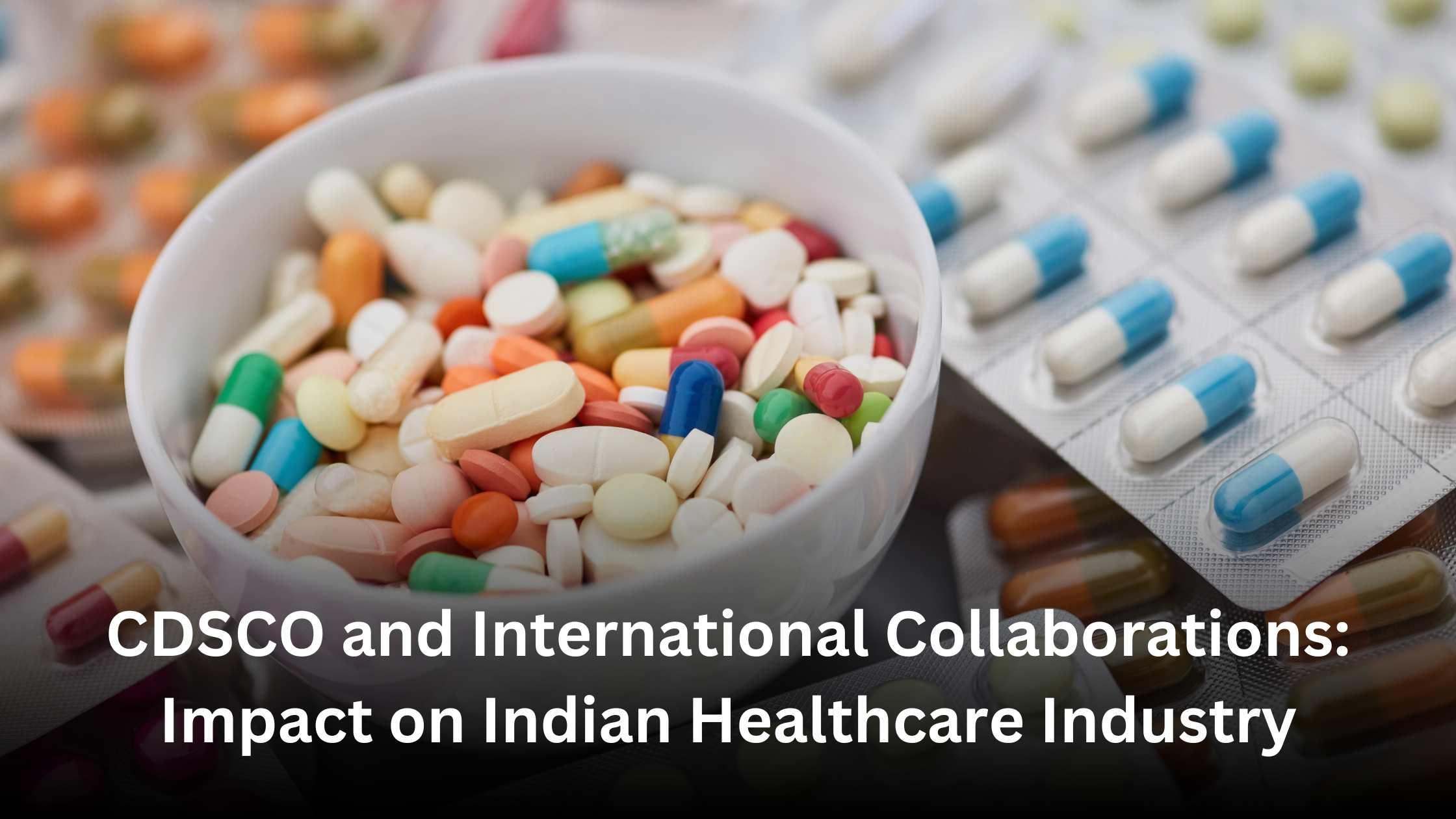CDSCO and International Collaborations: Impact on Indian Healthcare Industry

The Indian healthcare industry has grown significantly over the past decade, and much of this progress can be attributed to the robust regulatory framework provided by the Central Drugs Standard Control Organization (CDSCO). As the national regulatory authority for drugs, medical devices, cosmetics, and clinical trials, CDSCO ensures the safety, efficacy, and quality of healthcare products in India.
In recent years, CDSCO has expanded its focus to include international collaborations. These partnerships are shaping the future of healthcare in India by introducing global standards, fostering innovation, and strengthening the pharmaceutical, cosmetic, and medical device sectors.
In this blog, we will explore how CDSCO’s international collaborations are impacting the Indian healthcare industry and contributing to its growth.
What is CDSCO?
CDSCO is a part of the Directorate General of Health Services under the Ministry of Health and Family Welfare, Government of India. It regulates:
-
Drugs: Ensuring safe and effective medicines for the public.
-
Medical Devices: Overseeing the approval and quality of devices used in treatment and diagnosis.
-
Cosmetic Products: Granting licenses for cosmetic manufacturing and import to ensure consumer safety.
-
Clinical Trials: Monitoring trials to ensure ethical practices and accurate results.
By managing processes such as medical device registration, CDSCO import licenses, and CDSCO certificate registrations, the organization ensures that Indian healthcare products comply with both domestic and global standards.
Why International Collaborations Matter
The healthcare industry is no longer confined to national borders. Modern healthcare involves the exchange of knowledge, technology, and products between countries. For India, a country with a vast pharmaceutical industry and a growing medical device and cosmetic sector, international collaborations offer several benefits:
-
Adoption of Global Standards
Collaborating with global regulatory bodies helps CDSCO adopt international standards. This ensures Indian drugs, medical devices, and cosmetics meet the requirements of export markets, opening doors to countries like the USA, Europe, and Japan. -
Faster Approvals and Harmonization
Through harmonization initiatives such as the International Council for Harmonisation of Technical Requirements for Pharmaceuticals for Human Use (ICH), India can align its regulatory processes with global frameworks. This reduces delays in processes like medical device registration and approvals for new drugs. -
Access to Advanced Technologies
Partnerships with international agencies allow India to benefit from advanced technologies and best practices in healthcare product manufacturing, including cosmetics and medical devices. -
Boost to Exports
India is one of the largest exporters of generic drugs and has emerging markets for medical devices and cosmetics. International collaborations ensure compliance with global regulations, boosting the confidence of foreign buyers. -
Strengthening Domestic Healthcare
Global collaborations often involve knowledge sharing and training. This helps CDSCO and Indian companies improve domestic healthcare standards while catering to the international market.
Key International Collaborations of CDSCO
-
World Health Organization (WHO)
-
CDSCO collaborates with WHO to adopt Good Manufacturing Practices (GMP) and other standards for quality assurance.
-
This partnership has enhanced the reputation of Indian pharmaceutical and cosmetic products globally.
-
US Food and Drug Administration (FDA)
-
CDSCO works closely with the US FDA to align Indian drug approval processes with American standards.
-
Joint inspections and training programs have improved compliance with US regulations, particularly in areas like CDSCO certificate registration.
-
European Medicines Agency (EMA)
-
India has aligned its clinical trial regulations with those of EMA, making it easier for Indian companies to conduct trials and obtain approvals for medical devices and cosmetics.
-
International Council for Harmonisation (ICH)
-
India is a member of the ICH, which promotes uniformity in drug regulatory processes worldwide.
-
By following ICH guidelines, Indian companies can expand their reach in international markets.
-
Asia-Pacific Economic Cooperation (APEC)
-
CDSCO participates in APEC initiatives for capacity building in regulatory science.
-
This collaboration helps improve the quality and efficiency of Indian healthcare regulations.
Impact on Indian Healthcare Industry
1. Improved Quality of Products
International collaborations have raised the bar for the quality and safety of drugs, medical devices, and cosmetics in India. Processes like medical device registration and cosmetic manufacturing licensing are now more streamlined and globally competitive.
2. Growth of Cosmetic and Medical Device Sectors
With international support, CDSCO has introduced structured regulatory frameworks for both medical devices and cosmetic products. This has encouraged the development of high-quality, innovative products for domestic and global markets.
3. Increased Exports
India is known as the "pharmacy of the world" due to its large exports of generic medicines. Similar growth is now seen in exports of medical devices and cosmetics, driven by CDSCO’s focus on global standards and issuing CDSCO import licenses for international trade.
4. Faster Approvals
Global harmonization efforts have streamlined the drug and device approval process in India. This has reduced the time it takes for innovative drugs, devices, and cosmetics to reach the market, benefiting patients and consumers.
5. Enhanced R&D Capabilities
Collaborations with global agencies encourage Indian companies to invest in research and development (R&D). This supports innovation in areas such as medical devices, new drugs, and safe cosmetic formulations.
6. Better Clinical Trials
With stricter guidelines aligned with global standards, clinical trials in India are now more ethical and reliable. This has increased India’s attractiveness as a destination for conducting global clinical trials.
Challenges and Opportunities
While international collaborations have brought many benefits, they also come with challenges:
Challenges
-
Compliance Costs
Aligning with global standards can be expensive for small and medium-sized enterprises (SMEs), especially in areas like cosmetic manufacturing licenses and medical device compliance. -
Regulatory Delays
While harmonization aims to streamline processes, navigating multiple regulatory systems can sometimes cause delays in approvals, including for CDSCO import licenses. -
Capacity Building
Indian regulators and manufacturers need regular training to keep up with global standards.
Opportunities
-
Export Growth
By meeting international standards, Indian companies can access new markets and increase exports of drugs, medical devices, and cosmetics. -
Innovation Boost
Collaborations foster innovation in healthcare products, giving India a competitive edge in global markets. -
Improved Public Health
Access to better healthcare products and technologies improves the quality of care for Indian patients.
Conclusion
CDSCO’s international collaborations have significantly impacted the Indian healthcare industry, driving growth, innovation, and global recognition. By managing processes like medical device registration, issuing CDSCO import licenses, and granting cosmetic manufacturing licenses, CDSCO has ensured that Indian products meet global standards.
As India continues to strengthen its position in the global healthcare market, CDSCO’s efforts to collaborate with international bodies will play a crucial role in shaping the future of the industry.
India is well on its way to becoming a global leader in healthcare, thanks to the strong foundation laid by CDSCO and its international partnerships.
Read more - How to apply for a Drug License





